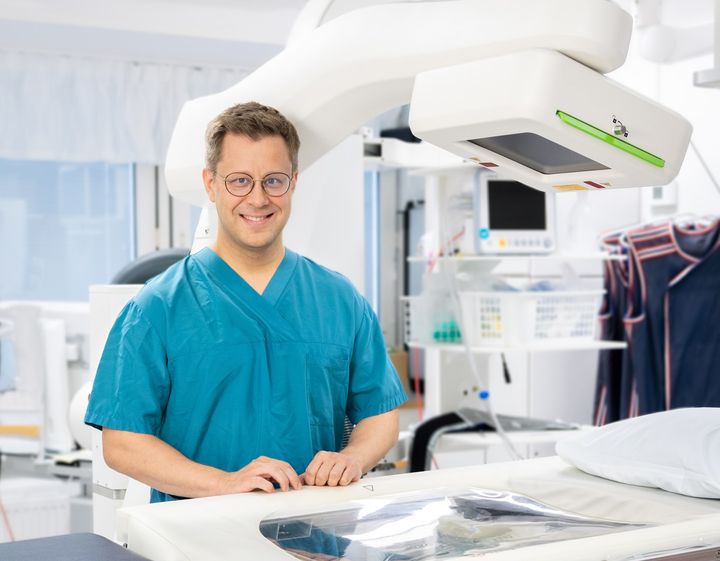Not all patients need antibiotics before shockwave lithotripsy for urolithiasis
An international study led by a HUS investigator examined the benefits, adverse effects, and necessity of antibiotics before shockwave lithotripsy in the prevention of infections.

Urolithiasis, or a urinary stone, is a common and painful condition that is often treated with extracorporeal shockwave lithotripsy. In the procedure, precisely targeted sound waves are directed at the stone from outside the body, breaking up the stone into smaller pieces, which are then passed out of the body in the urine. The procedure exposes the patient to urinary tract infections.
Extensive evidence on antibiotic use in shockwave lithotripsy for urolithiasis
An international research group led by Professor Kari Tikkinen from the University of Helsinki, who works as a urologist at HUS, examined the benefits and harms of antibiotic prophylaxis, or the use of antibiotics to prevent infections, in shockwave lithotripsy for urolithiasis.
The study covered over 1700 patients from nine countries, including over 360 HUS patients. The patients were randomized into two groups, one of which received ciprofloxazin and the other placebo before the shockwave lithotripsy procedure. A total of 1.3% of the patients in the antibiotic group and 2.7% of the patients in the placebo group were diagnosed with symptomatic urinary tract infection. Pyelonephritis only occurred in the placebo group with no cases reported in the antibiotic group. Urosepsis was not observed, and no severe adverse effects were reported.
The global threat of antibiotic resistance must be taken into account, and antibiotics should be used with consideration
“One dose of ciprofloxazin can reduce the risk of serious infection, but as the absolute benefit is low, the decision on the use of antibiotic prophylaxis should be made on a case-by-case basis, taking into account the patient’s risk factors, what the patient wants, and the prevention of antibiotic resistance,” Tikkinen says.
The results of the APPEAL trial led by Tikkinen provide a basis for updating international treatment guidelines. Tikkinen points out that healthcare needs to develop better ways of identifying the patients who benefit the most from the use of antibiotic prophylaxis. A dose of antibiotics before a shockwave lithotripsy procedure may prevent rare but severe infections, but it is not needed for most low-risk patients.
Link to the research article: A Multicenter Randomized Controlled Trial of Antimicrobial Prophylaxis to Prevent Urinary Tract Infections after Shockwave Lithotripsy for Urolithiasis: The APPEAL Trial
In a university hospital, research is part of the treatment: we continuously evaluate and develop care based on scientific research evidence and patient experience. At HUS, we conduct close research collaboration with the Faculty of Medicine at the University of Helsinki. We publish approximately 2,400 peer-reviewed research articles) annually, which we highlight in our newsfeed.
The HUS media service is available for the media Mon–Thu 10:00 a.m.–4:00 p.m. and Fri 10:00 a.m.–3:00 p.m., tel. 050 427 2875, or via e-mail: viestinta@hus.fi.
About HUS
HUS Helsinki University Hospital is the biggest provider of specialized healthcare in Finland. Our high expertise is internationally recognized and accredited. As a university hospital, we are on the cutting edge of developing and evaluating our treatment methods and activities.
HUS treats almost 700,000 patients every year. Our more than 27,000 professionals work to provide the best possible care for our patients. We are responsible for organizing specialized health care in the Uusimaa region. The treatment of many rare and difficult diseases in Finland has been centralized to HUS as well.
HUS – Leading healthcare
The HUS media service is available for the media Mon–Thu 10:00 a.m.–4:00 p.m. and Fri 10:00 a.m.–3:00 p.m., tel. 050 427 2875, or via e-mail: viestinta@hus.fi.
hus.fi/en
Alternative languages
Subscribe to releases from HUS
Subscribe to all the latest releases from HUS by registering your e-mail address below. You can unsubscribe at any time.
Latest releases from HUS
HPV-test är effektivare och lika säkert som gynekologiskt cellprov vid screening för livmoderhalscancer15.12.2025 14:14:42 EET | Pressmeddelande
Förstadieförändringar upptäcks bättre vid HPV-screening än vid screening med gynekologiskt cellprov (papa). Det är viktigt att delta i screeningen när man får en kallelse.
HPV-testi on tehokkaampi ja yhtä turvallinen kuin papakoe kohdunkaulan syövän seulonnassa15.12.2025 14:14:42 EET | Tiedote
HPV-seulonta löytää esiastemuutokset papaseulontaa herkemmin. Seulontaan kannattaa osallistua, kun siihen saa kutsun.
HPV test is more effective and as safe as Pap smear in cervical cancer screening15.12.2025 14:14:42 EET | Press release
HPV screening is more sensitive in detecting precancerous changes than Pap screening. It is advisable to participate in the screening when the invitation comes.
HUS ser ut att lyckas balansera ekonomin och täcka underskotten före slutet av 202515.12.2025 12:32:47 EET | Pressmeddelande
HUS-sammanslutningens styrelse behandlade på sitt möte den 15 december den sista årsprognosen för 2025. Enligt den lyckas HUS som första aktör inom social- och hälsovården balansera sin ekonomi och täcka sitt underskott på det sätt och inom den tidtabell som krävs enligt lag.
HUS-yhtymä näyttää onnistuvan talouden tasapainottamisessa ja alijäämien kattamisessa vuoden 2025 loppuun mennessä15.12.2025 12:21:57 EET | Tiedote
HUSin yhtymähallitus käsitteli 15.12. kokouksessaan vuoden 2025 viimeistä vuosiennustetta, jonka mukaan HUS-yhtymä pystyy ensimmäisenä julkisena sote-toimijana tasapainottamaan taloutensa ja kattamaan alijäämänsä lain edellyttämällä tavalla ja aikataulussa.
In our pressroom you can read all our latest releases, find our press contacts, images, documents and other relevant information about us.
Visit our pressroom